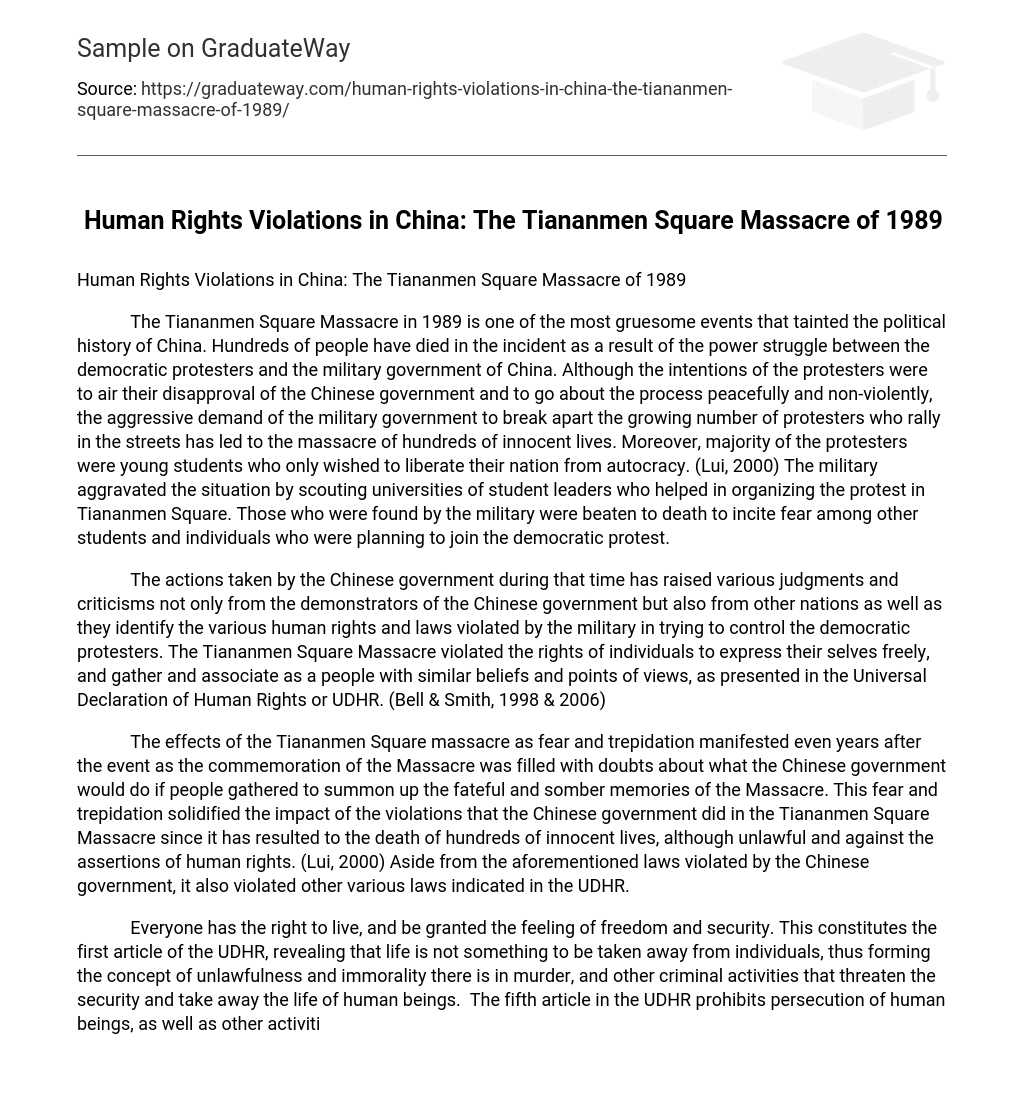The Tiananmen Square Massacre in 1989 is one of the most gruesome events that tainted the political history of China. Hundreds of people have died in the incident as a result of the power struggle between the democratic protesters and the military government of China. Although the intentions of the protesters were to air their disapproval of the Chinese government and to go about the process peacefully and non-violently, the aggressive demand of the military government to break apart the growing number of protesters who rally in the streets has led to the massacre of hundreds of innocent lives. Moreover, majority of the protesters were young students who only wished to liberate their nation from autocracy. (Lui, 2000)
The military aggravated the situation by scouting universities of student leaders who helped in organizing the protest in Tiananmen Square. Those who were found by the military were beaten to death to incite fear among other students and individuals who were planning to join the democratic protest.
The actions taken by the Chinese government during that time has raised various judgments and criticisms not only from the demonstrators of the Chinese government but also from other nations as well as they identify the various human rights and laws violated by the military in trying to control the democratic protesters. The Tiananmen Square Massacre violated the rights of individuals to express their selves freely, and gather and associate as a people with similar beliefs and points of views, as presented in the Universal Declaration of Human Rights or UDHR. (Bell & Smith, 1998 & 2006)
The effects of the Tiananmen Square massacre as fear and trepidation manifested even years after the event as the commemoration of the Massacre was filled with doubts about what the Chinese government would do if people gathered to summon up the fateful and somber memories of the Massacre. This fear and trepidation solidified the impact of the violations that the Chinese government did in the Tiananmen Square Massacre since it has resulted to the death of hundreds of innocent lives, although unlawful and against the assertions of human rights. (Lui, 2000) Aside from the aforementioned laws violated by the Chinese government, it also violated other various laws indicated in the UDHR.
Everyone has the right to live, and be granted the feeling of freedom and security. This constitutes the first article of the UDHR, revealing that life is not something to be taken away from individuals, thus forming the concept of unlawfulness and immorality there is in murder, and other criminal activities that threaten the security and take away the life of human beings.
The fifth article in the UDHR prohibits persecution of human beings, as well as other activities that are inhuman and degrading. (“The Universal Declaration of Human Rights, 2006) Massacring hundreds of students is inhuman, and the hunting down of students in universities due to their genuine or suspected involvement in the protest and beating them to death is also inhuman and degrading.
Perhaps the ninth article in the UDHR is one of the major violations committed by the Chinese government since it forbids the arbitrary and subjective hostile treatments for individuals. (“The Universal Declaration of Human Rights, 2006) Killing hundreds of protesters was a subjective move to control the events during that time to their advantage. As citizens of the country, the students and other individuals who joined the protest had the right to express their opinions and points of view to their government – the one institution expected to protect and serve the people.
These rights are protected the eighteenth and the nineteenth articles of the UDHR which grants individuals the right or the freedom to air and stand by with personal thoughts and opinions, as well as the choice of religion, and the freedom of expressing or airing these thoughts and opinions. (“The Universal Declaration of Human Rights,” 2006)
The subjectivity of the Chinese government’s actions is due to the fact that what they did was to protect their personal interests. The protest was allegedly done in peaceful and non-violent way eliminating the provocation of the need for the military to intervene and kill protesters. How the Chinese government handled the matter was out of line and rash provided the many options that could have been presented in order to resolve the issue. Non-hostile means of negotiating and going over the process of obtaining what the public needs and wants from the government while at the same time reconciling these ideas with the government’s priorities and points of views could have been conducted.
However, the structure of the Chinese government patterned after autocracy could have been the reason why the violations were committed. The Chinese government was concerned with the submission of the people to the laws, rules and policies implemented by the country’s leader that it was not open to any revolts or any other form of protests that attack what it has established as national policies and laws.
Violations continue until the present since some people involved in the Tiananmen Square protest are taken as prisoners against their will. From writers or journalists to student leaders, intellects and other professionals, they are being condemned by the Chinese government due to their involvement in the protests which is entirely disagreeable to the Communist structure of the Chinese government. (Plafker, 1999)
References
- Bell, D. A. (1998). Justice as Impartiality. Political Theory, 26.n4. Retrieved December 12, 2008, from General OneFile via Gale.
- Lui, A. (2000). Looking Back at Tiananmen Square. Peace Review. Retrieved December 12, 2008, from EBSCO Host. Website: http://search.ebscohost.com/login.aspx?direct=true&db=a9h&AN=3453581&site=ehost-live
- Plafker, T. (1999). Measuring Academic Freedom in China is More Subtle than Headlines Portray. The Chronicle of Higher Education, 45.26. Retrieved December 12, 2008, from General OneFile via Gale.
- “The Universal Declaration of Human Rights.” (2006). International Debates. Retrieved December 13, 2008, from EBSCO Host.





